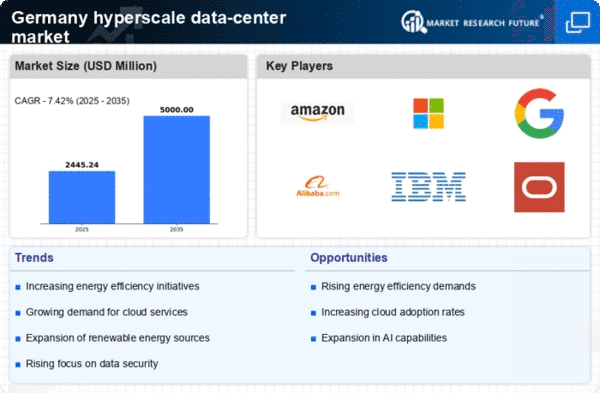Growing Demand for Cloud Services
The increasing reliance on cloud computing services is a primary driver for the hyperscale data-center market. In Germany, businesses are rapidly adopting cloud solutions to enhance operational efficiency and scalability. This trend is reflected in the projected growth of the cloud services market, which is expected to reach €20 billion by 2025. As organizations migrate to cloud-based infrastructures, the demand for hyperscale data centers, which can support vast amounts of data and provide robust computing power, is likely to surge. The hyperscale data-center market is thus positioned to benefit significantly from this shift, as companies seek to leverage the advantages of cloud technology.
Regulatory Compliance and Data Sovereignty
Germany's stringent data protection regulations, including the General Data Protection Regulation (GDPR), create a pressing need for hyperscale data centers to ensure compliance. Organizations are increasingly required to store and process data within national borders, which drives the demand for local hyperscale facilities. The hyperscale data-center market must adapt to these regulatory frameworks, ensuring that data handling practices meet legal standards. This compliance not only protects consumer privacy but also enhances trust in digital services. As a result, the hyperscale data-center market is likely to see growth as companies invest in infrastructure that aligns with regulatory requirements.
Advancements in Energy Efficiency Technologies
Energy efficiency remains a critical concern for the hyperscale data-center market, particularly in Germany, where energy costs are high. The adoption of advanced cooling systems, energy-efficient hardware, and renewable energy sources is becoming increasingly prevalent. Reports indicate that energy-efficient data centers can reduce operational costs by up to 30%. As organizations strive to minimize their carbon footprint and comply with environmental regulations, the hyperscale data-center market is likely to experience a surge in demand for facilities that prioritize sustainability. This focus on energy efficiency not only benefits the environment but also enhances the economic viability of data center operations.
Increased Investment in Digital Infrastructure
The German government and private sector are significantly investing in digital infrastructure, which is a key driver for the hyperscale data-center market. Initiatives aimed at enhancing broadband connectivity and digital services are expected to bolster the demand for data centers. The investment in digital infrastructure is projected to exceed €10 billion by 2025, creating a favorable environment for the hyperscale data-center market. This influx of capital is likely to facilitate the development of new facilities and the expansion of existing ones, thereby supporting the growing needs of businesses and consumers for reliable data services.
Rising Adoption of Artificial Intelligence and Big Data
The increasing utilization of artificial intelligence (AI) and big data analytics is driving the hyperscale data-center market in Germany. As organizations seek to harness the power of data for decision-making and operational efficiency, the demand for robust data processing capabilities is escalating. The hyperscale data-center market is well-positioned to support these technological advancements, as it offers the necessary infrastructure to handle large volumes of data and complex computations. With the AI market projected to grow at a CAGR of 30% through 2025, the hyperscale data-center market is likely to see substantial growth as companies invest in data-driven technologies.
















